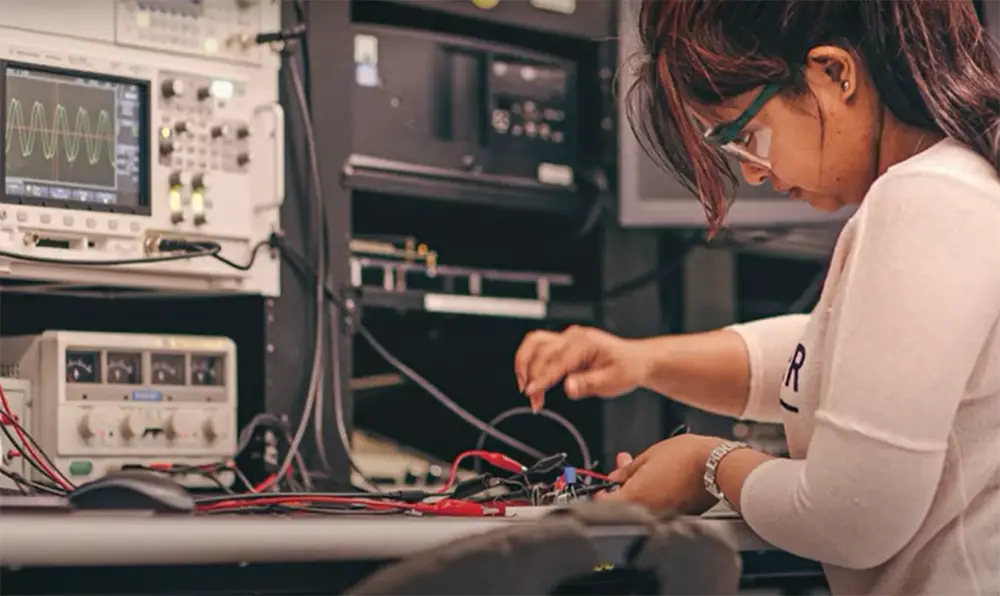Do you want to become an electronics engineer? It’s a great career choice! In this blog post, we will discuss the steps that you need to take to make it happen. We will also talk about the skills and knowledge that you will need to succeed in this field. So if you’re ready to start your journey toward becoming an electronics engineer, keep reading!
Should I Become an Electronics Engineer?
The job outlook for electronic engineers is expected to be good in the coming years. The demand for electronic goods is increasing, and there is a need for qualified engineers to design and develop these products. If you are interested in a career in this field, you should consider becoming an electronics engineer.
It is a good job for those who like working with their hands and minds. You will be able to work on a variety of projects, and you will have the opportunity to use your creativity to design new products.
Pros and Cons of Becoming an Electronics Engineer
There are both pros and cons to becoming an electronics engineer.

Here are some advantages: [3]
- You can work in a variety of industries – There are few industries that don’t use electronics these days, so you’ll have plenty of job options as an electronics engineer. For example, you could work in the automotive industry, designing and testing electronic components for cars.
- You are always learning – Technology is always changing, so you’ll need to keep up with the latest developments in your field. This can be a challenge, but it also means that you’re always learning new things and expanding your knowledge.
- You can work independently or on a team – As an electronics engineer, you can choose to work independently or on a team. If you enjoy working on your own, you can be a freelance engineer. If you prefer working with others, you can find a job in a company where you’ll collaborate with other engineers to design and develop new products.
- You can work on cutting-edge technology – As an electronics engineer, you’ll always be working with the latest and greatest technology. If you’re someone who likes to stay at the forefront of technological innovation, this is a great career choice for you.
- Flexibility in job location – Because electronics are used everywhere, you’ll have the opportunity to work in a variety of locations as an electronics engineer. You can work in a big city, or you can work in a rural area – it’s up to you.
- You can have a high salary – Electronics engineers are well-paid, especially if you work in a high-demand industry like aerospace or defense. If you’re looking to make a good living, this is a great career to consider.
- You can use your creativity to solve problems – Electronics engineering is a highly creative field, where you’ll be constantly challenged to find new and innovative solutions to complex problems. For example, you might be tasked with designing a new type of radar system or developing a new way to test electronic components.
However, there are also some disadvantages to becoming an electronics engineer:
- The work can be very challenging – Because electronics engineering is such a complex and ever-changing field, it can be quite challenging to keep up with the latest developments. If you’re not someone who enjoys being constantly challenged, this may not be the right career for you.
- The work can be stressful – With the high level of responsibility that comes with being an electronics engineer, it’s not surprising that the job can be quite stressful at times. If you’re looking for a low-stress career, this is probably not it.
- You may have to work long hours – Due to the nature of the job, electronics engineers often have to work long hours, including nights and weekends. If you’re not willing to put in the extra time, this career may not be for you.

- The job market for electronics engineers is competitive – Because there are so many people interested in becoming electronics engineers, the job market can be quite competitive. If you’re not prepared to compete for jobs, you may want to consider another career.
- You need to have a strong understanding of physics and math – To be successful as an electronics engineer, you need to have a strong understanding of both physics and math. If you’re not comfortable with these subjects, this is probably not the right career for you. I am not sure if this is a pro or a con.
- You need to be able to work with small components – As an electronics engineer, you’ll be working with very small components. If you’re not comfortable with this, it’s probably not the right career for you.
What Does an Electronics Engineer Do?
There are a lot of tasks that an electronics engineer might do in a day.
This could include anything from meeting with clients to discuss their needs, to working on the design of a new product, to testing prototypes, to supervising the manufacturing process.
In general, though, electronics engineers are responsible for developing and improving electronic equipment. [2]
This could be anything from cell phones to computers to medical equipment.
Here are some specific duties that an electronics engineer might have:
- Designing electronic circuits and components – You’ll need to have a strong understanding of electronic theory in order to do this. For example, you’ll need to know about topics like Ohm’s law and capacitors in order to design circuits.
- Creating prototypes – Once you’ve designed a circuit, you’ll need to build a prototype so that it can be tested. This involves soldering components onto a board and making sure that everything is connected correctly. Or, if you’re working with software, you might need to write code and test it on a computer.
- Testing prototypes – Once you’ve created a prototype, it’s important to test it to see if it works as intended. This involves running tests and collecting data. If the prototype doesn’t work as intended, you’ll need to go back and make changes.
- Identifying problems with existing products and designing solutions to improve their performance – This could involve anything from troubleshooting a cell phone that keeps crashing to redesigning the antenna on a laptop. If you find a problem, it’s your job to come up with a solution.

- Supervising the manufacturing process – Once a product has been designed and tested, it needs to be manufactured. Electronics engineers often oversee this process to ensure that everything is done correctly. This includes making sure that the right components are used and that the finished product meets all safety and quality standards.
- Analyzing data from tests – Data from tests is used to improve products. Electronics engineers often analyze this data to identify problems and make changes to the design. In addition, they may use data to develop new products.
- Working with other engineers and technicians to create the final product – Electronics engineers often work with other engineers, such as mechanical engineers, to create the final product. For example, if you’re working on a new cell phone, you might need to work with a mechanical engineer to design the housing. You might also work with technicians who will assemble the final product.
- Installing and creating electronic systems – This could involve anything from setting up a new computer network to installing security cameras. For example, if you’re setting up a new security system, you’ll need to determine the best way to install the cameras and other components. You might also need to train people on how to use the system.
- Creating and maintaining technical documentation – This includes documents like product manuals and user guides. It’s important that this documentation is accurate and up-to-date so that users can understand how to use the product correctly.
- Providing customer support – This involves answering questions from customers and helping them to troubleshoot problems. For example, if a customer is having trouble using a product, you’ll need to help them figure out the problem. In some cases, you might also need to provide training on how to use the product.
Electronics Engineer Jobs
There are many different types of jobs for electronics engineers. Here are some of the most common types of jobs:

- Design engineer: creates new products or improves existing ones
- Development engineer: oversees the development and production of electronic products
- Quality assurance engineer: evaluates and tests products to ensure they meet quality standards
- Sales engineer: promotes and sells electronic products to customers
- Service engineer: provides maintenance and repair services for electronic products
- Systems engineer: designs and develops complex electronic systems
- Teaching engineer: trains other engineers or students in electronics engineering
- Management engineer: plans and coordinates the work of other engineers
- Research engineer: investigates new technologies and applications for electronics engineering
So, if you’re interested in becoming an electronics engineer, you have plenty of options to choose from!
Top Skills For an Electronics Engineer
Here are some essential skills for an electronics engineer: [1]
- Communication: The ability to communicate technical information clearly and concisely is essential for an electronics engineer. They need to be able to explain their designs and concepts to colleagues, clients, and managers.
- Analytical skills: Electronics engineers need to be able to analyze complex problems and design creative solutions. They must be able to identify the root cause of problems and design systems that are reliable and efficient.
- Math and physics skills: A strong understanding of physics and math is essential for an electronics engineer. They need to be able to apply mathematical concepts to the design and analysis of electronic systems. If you want to become an electronics engineer, you will need to develop these skills.
- Computer-aided design (CAD) skills: Electronics engineers use CAD software to create and test designs. They need to be able to use these tools effectively to create accurate and efficient designs. You have to be familiar with the different types of CAD software and how to use them.
- Project management skills: Electronics engineers often work on complex projects with tight deadlines. They need to be able to plan and manage projects effectively. They need to be able to schedule work, set deadlines, and track progress.
- English language skills: Many electronics engineers work in multinational companies. They need to be able to communicate effectively in English. You will need to have strong written and spoken English language skills if you want to become an electronics engineer.

These are some essential skills for an electronics engineer. You can learn more about these skills by taking courses or attending workshops. There are many resources available online and offline that can help you develop these skills. Electronics engineering is a challenging and rewarding field. With hard work and dedication, you can become an electronics engineer.
How to become an Electronics Engineer
Finally, let’s get into how you can become an electronics engineer.
- First, you need to get a degree in electrical engineering from an accredited institution. Most employers prefer candidates with a master’s degree or higher, so getting your Ph.D. is a good idea if you want to advance in your career. Some companies don’t require a degree but will require you to have significant experience in the field. At least you need to have a certificate or related experience to qualify for many entry-level positions.
- You can start by attending courses or watching YouTube videos related to electronics. There are many online courses available that can teach you the basics of electronics engineering. You can also join professional organizations such as the Institute of Electrical and Electronics Engineers (IEEE) which offer many resources for students and professionals.
- After you’ve got your degree or certificate, it’s time to start looking for jobs. You can search online job boards, or look for companies that are hiring on Indeed or LinkedIn. Once you’ve found a few potential positions, it’s time to start applying. Make sure your resume is up-to-date and tailored to each position, and include a cover letter outlining why you’re a good fit for the role. Once you’ve submitted your application, all that’s left to do is wait for a response. If you don’t hear back right away, don’t be discouraged – sometimes it takes weeks or even months to hear back from employers.
If you want to work in the industry, it’s a good idea to get an internship while you’re still in school. This will give you the opportunity to gain experience and learn about the different aspects of the job. Many companies also offer entry-level positions for engineering graduates, so this is a great way to get your foot in the door.
- Next, you need to gain experience by working in the field. You can do this by interning at an electronics company or working as a research assistant in a laboratory. For example, many electronics engineers start their careers as technician interns, working their way up the ladder. You can also volunteer to work on projects with a local community organization or charity. This is a great way to get experience and make a difference at the same time.
- Last, but not least, you need to keep up with the latest trends in the field. Once you have a job, it’s important to keep up with the latest trends and technologies. This can be done by attending conferences, reading industry publications, and networking with other professionals. You should also consider pursuing additional education or certification to stay ahead of the curve. This will not only make you more marketable to employers, but it will also help you be more successful in your career.

By following these steps, you can become an electronics engineer. It’s a challenging but rewarding career, and there are many opportunities for growth. So if you’re passionate about electronics and want to make a difference in the world, consider becoming an engineer.
Useful Tips
Here are some tips that can help you to be a good electronics engineer:
- Read books and articles related to electronics. This will help you to be up-to-date with the latest technologies and advancements in the field of electronics.
- Join an electronics engineering forum. This will give you a chance to interact with other engineers and learn from their experiences.
- Attend conferences and seminars related to electronics engineering. This will help you to keep abreast of the latest developments in the field.
- Work hard and never give up on your dreams. With dedication and hard work, you can achieve anything you set your mind to.
- Google “How to Become an Electronics Engineer” and read everything you can find on the subject. This will give you a good overview of what is required to become an engineer.
- Just google if you have some questions. Be patient and keep learning. Don’t be afraid to ask for help when you need it. There are many people who are willing to help you if you just ask. Never stop learning.
- Watch YouTube videos. This is a great way to learn about electronics and engineering concepts. Moreover, it is a great way to bond with like-minded people.
- Be active on social media. There are many engineers who are active on social media and they can be a great source of information and inspiration.
- Try different approaches. There is no one right way to become an engineer. You have to find the approach that works best for you. Don’t be afraid to fail. Failure is a part of the learning process. If you don’t make mistakes, you will never learn and grow as an engineer.
- Last but not least, don’t forget to have fun. Electronics engineering is a challenging and rewarding field that can provide you with a lifetime of satisfaction. So, enjoy the journey and never give up on your dreams.
If you follow these tips, you’ll be well on your way to becoming a successful electronics engineer. Just remember to never give up on your dreams and always keep learning.
FAQ
Is electronics engineering a good career?
There are many different engineering fields, and each has its own unique set of benefits. However, electronics engineering is often considered a good career choice because it offers a good salary, job security, and opportunities for advancement.
How old do you have to be to become an electronics engineer?
There is no set age requirement to become an electronics engineer. However, most engineers start their careers after completing a four-year college degree.
What do you need to study to become an electronics engineer?
To become an electronics engineer, you need to have a strong foundation in math and science. You should also consider taking courses in electrical engineering, physics, and computer science.
Is IT hard to be an electronics engineer?
No, electronics engineering is not difficult. However, it is important to have a strong understanding of mathematics and physics. Additionally, it is helpful to be familiar with software and hardware design.
Which engineering is in high demand?
There is currently a high demand for electrical engineers, as well as computer science and software engineering. Additionally, there is expected to be high demand for biomedical engineers and environmental engineers in the near future.
How long does it take to become an electronics engineer?
It typically takes four years to complete an undergraduate degree in electronics engineering. Many people choose to pursue a master’s degree or higher. However, some people do not want to get any degree, so they take courses online or through community colleges.
Useful Video: How to Become a Good Electronic Engineer | Career Guide 2019
Final Thoughts
Overall, becoming an electronics engineer is a very rewarding career choice. Not only will you be able to work with cutting-edge technology, but you’ll also be able to help shape the future of our world. With the ever-growing demand for electronic devices, there’s never been a better time to enter this field.
If you’re interested in becoming an electronics engineer, be sure to do your research and ask plenty of questions. Once you have a good understanding of what’s required, you’ll be well on your way to a successful career in this exciting field. Thanks for reading!
Now you know how to become an electronics engineer. What are you waiting for? Start your research today and begin your journey to a rewarding career in this cutting-edge field!
I hope you enjoyed this article on how to become an electronics engineer. If you have any questions or comments, please feel free to leave them below. I wish you the best of luck in your future endeavors!
If you enjoyed this article, please share it with your friends or colleagues.
Thanks for reading! until next time.
References:
- https://www.zippia.com/electronics-engineer-jobs/
- https://www.gooduniversitiesguide.com.au/careers-guide/electronics-engineer
- https://www.collegedekho.com/careers/electronics-engineer






 In my opinion, the job prospects for electronic engineers are promising. The growing demand for electronic products creates opportunities for those interested in designing and developing these innovations. It’s an exciting career path that combines hands-on work with intellectual challenges, allowing engineers to unleash their creativity and contribute to technological advancements.
In my opinion, the job prospects for electronic engineers are promising. The growing demand for electronic products creates opportunities for those interested in designing and developing these innovations. It’s an exciting career path that combines hands-on work with intellectual challenges, allowing engineers to unleash their creativity and contribute to technological advancements.






Leave a Reply